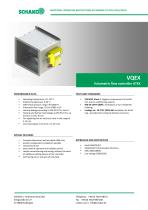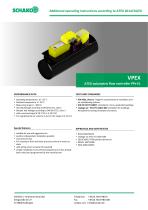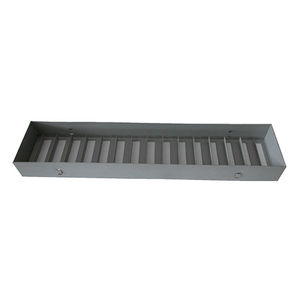
- Company
- Products
- Catalogs
- News & Trends
- Exhibitions
Air flow regulator VQEX

Add to favorites
Compare this product
Description
for supply and return air systems
for hazardous areas of zones 1, 2, 21 and 22
also for explosion group llC in zones 1 and 2 (gases)
Control components with protection index IP 66
for constant (CAV) or variable (VAV) systems
for positive control Vmin, Vmid, Vmax, “OPEN” or “CLOSED”
For volumetric flow and linear pressure control
Measuring range: 0…300 Pa
at ambient temperatures 0 °C…20 °C to 50 °C, requirement: measuring air 0…+50 °C/5…95% rH, non-condensing
with command signal 0…10V DC, 2…10V DC,
with supply voltage 24V AC / DC +/- 15%, 50/60Hz
with DD varnish coating for aggressive media (please refer to the resistance table in a separate brochure)
for regulating the air velocity in the duct in the range of 2…13 m/s
can also be used with vertical axis
The rectangular volumetric flow controller type VQEX made of galvanised steel is suitable for use with aggressive components of polluted air (only with DD varnish coating or of 1.4301 stainless steel for HKU) and in areas subject to explosion hazards. The SCHAKO VQEX has been approved for all gases in zone 1, zone 2, as well as for dusts in zones 21 and 22. The SCHAKO VQEX can also be used in zones 1 and 2 of the explosion group IIC.
A volumetric flow controller is used for pressure-independent volumetric flow regulation in ventilation and air-conditioning systems. It serves to keep the volumetric flow either constant within specified limits (CAV) or to control it variably (VAV).
Housing, measuring sensor, control flap, PID controller with pressure sensor and actuator form a closed control loop with feedback, allowing demand-dependent, energy-saving air conditioning of single rooms or areas of air-conditioning systems.
Related Searches
- Air conditioning unit
- Air grating
- Metal ventilation grill
- Rectangular air grating
- Commercial air conditioning unit
- Reversible air conditioning unit
- Displacement air diffuser
- Aluminium ventilation grill
- Outdoor ventilation grill
- Ceiling displacement air diffuser
- White ventilation grill
- Wall-mounted air conditioning unit
- Facade ventilation grill
- Monobloc air conditioning unit
- Commercial ventilation grill
- Home ventilation grill
- Air filter
- Circular air diffuser
- Square displacement air diffuser
- Low-noise air conditioner
*Prices are pre-tax. They exclude delivery charges and customs duties and do not include additional charges for installation or activation options. Prices are indicative only and may vary by country, with changes to the cost of raw materials and exchange rates.












